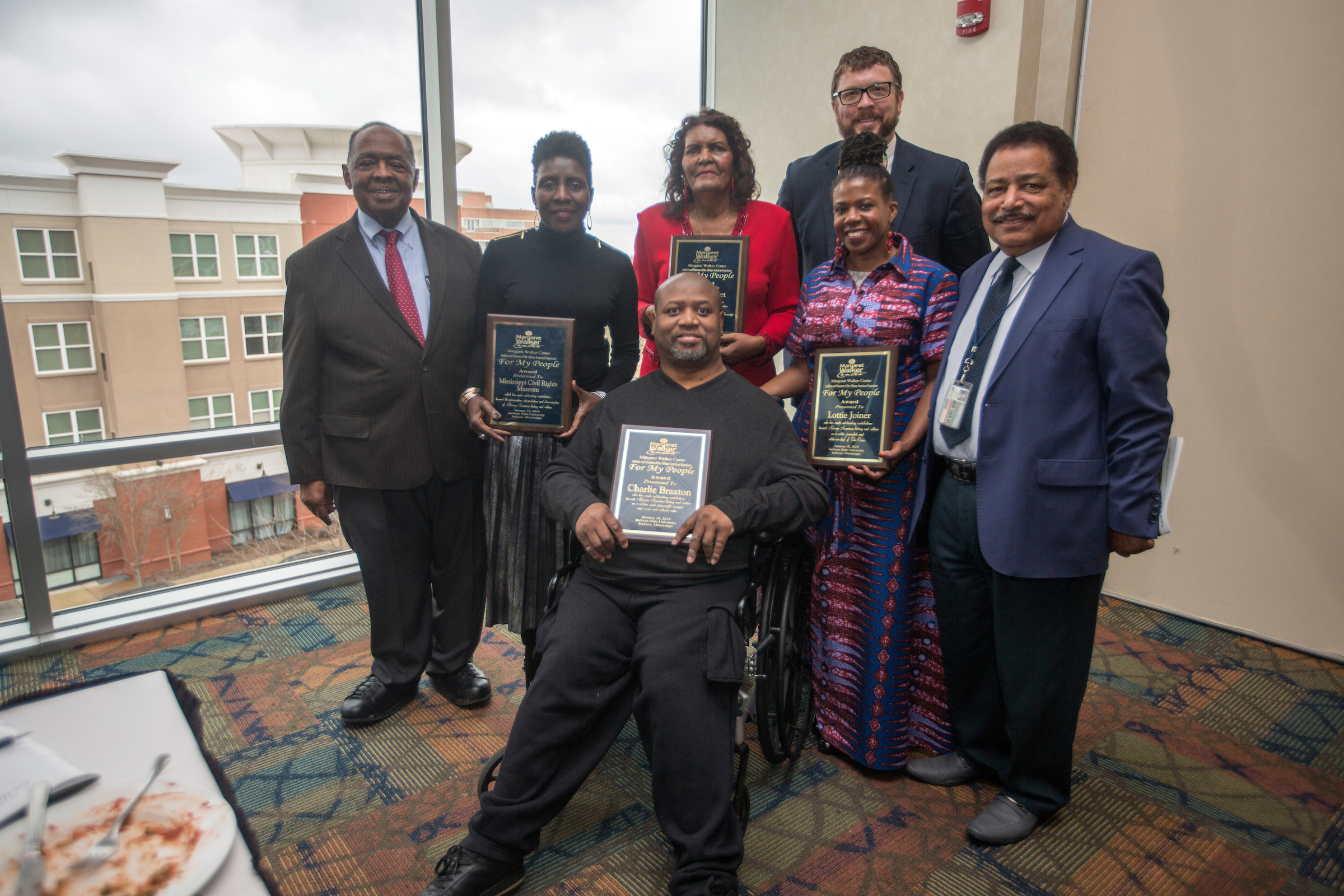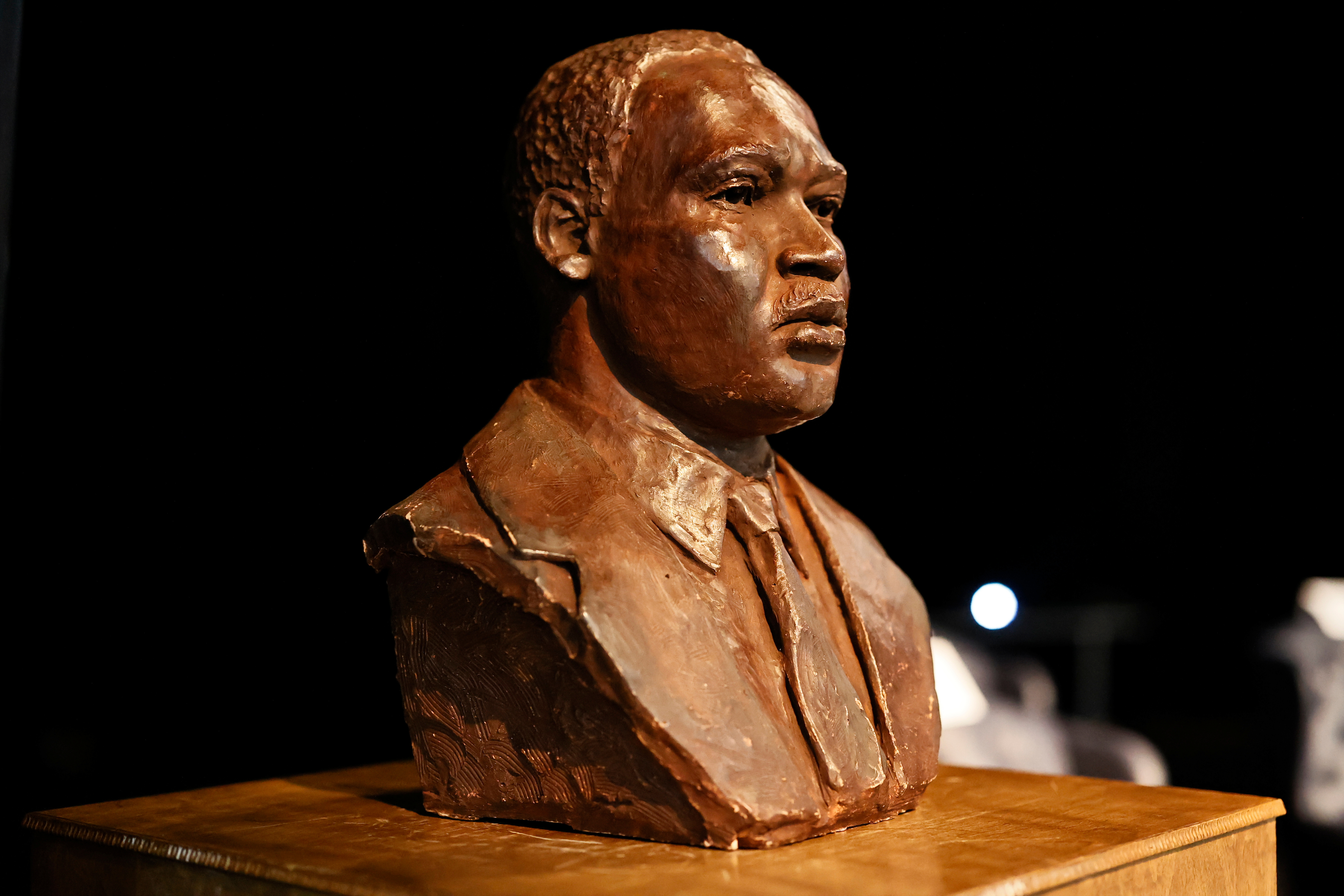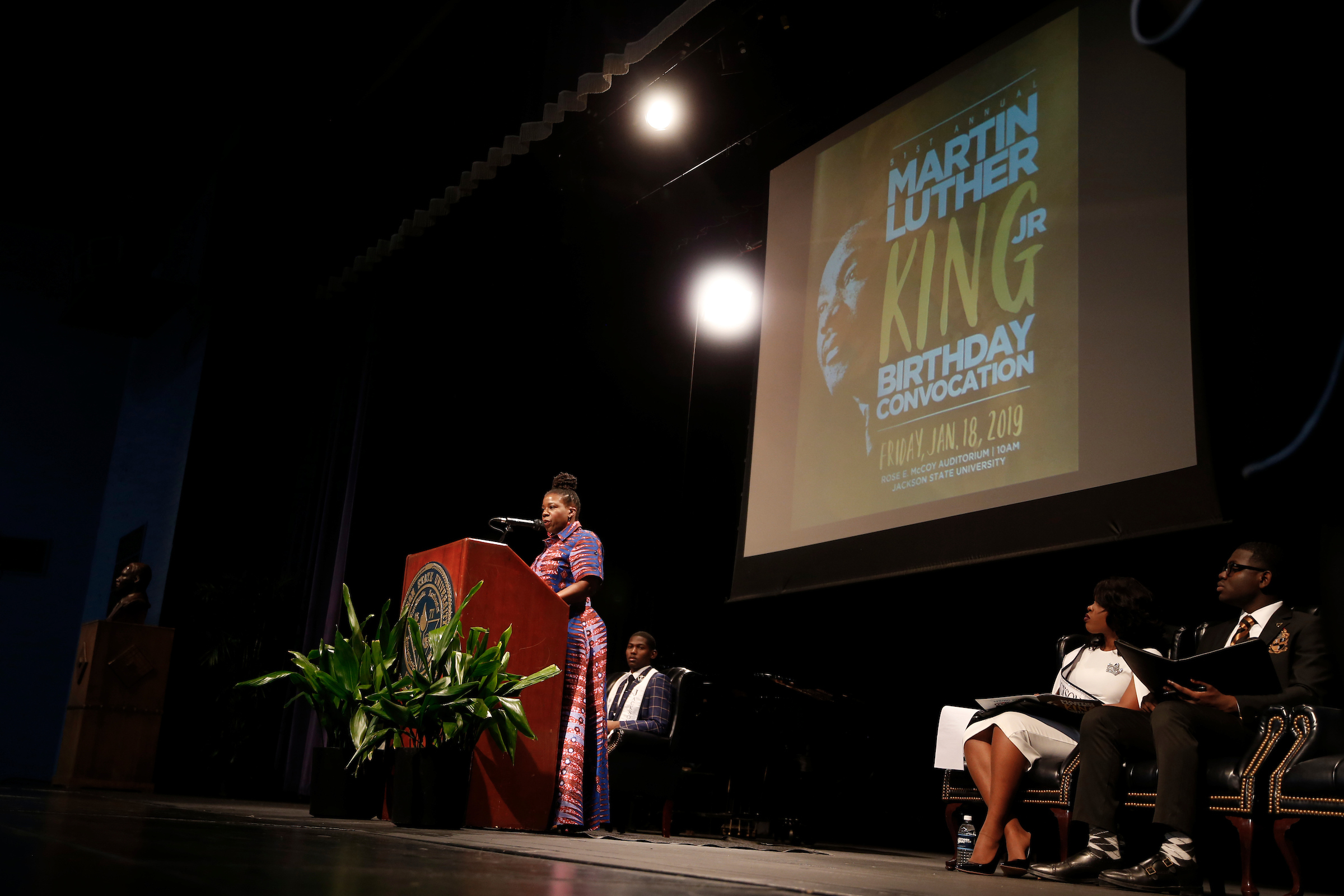
![]() [hr]
[hr]
As a JSU student, Lottie Joiner said she never imagined returning to her alma mater more than 20 years later to keynote the Martin Luther King Jr. Birthday Convocation hosted by the Margaret Walker Center at the Rose E. McCoy Auditorium.
“I want you guys to remember, eyes haven’t seen, and ears haven’t heard all the plans God has for you,” Joiner, editor-in-chief for Crisis Magazine, the official publication of the NAACP, told the audience on Friday, Jan. 18.
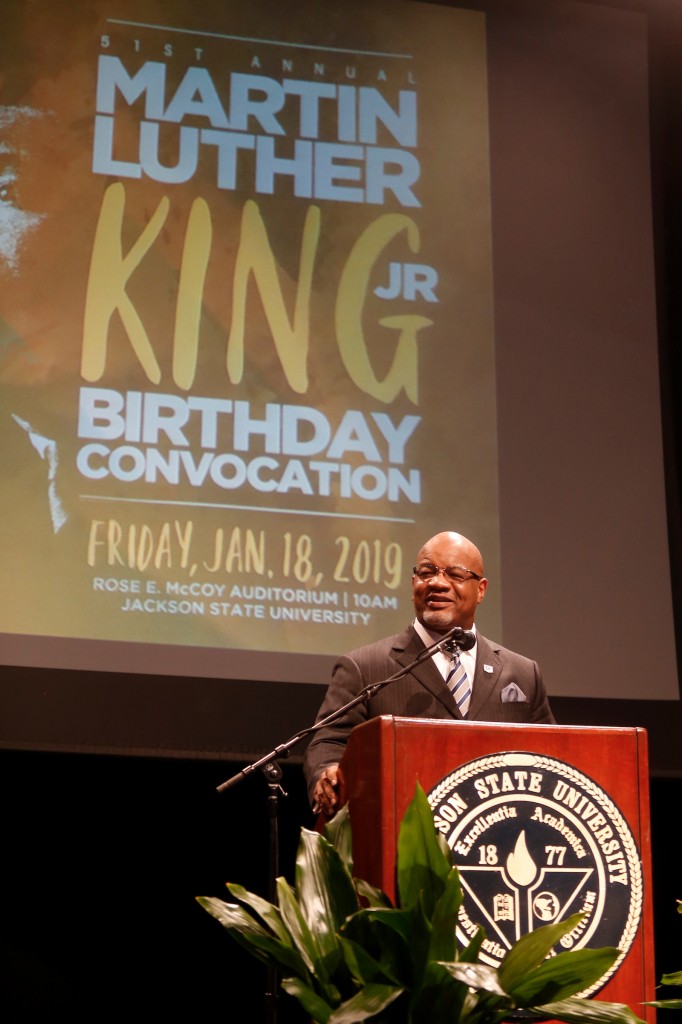
Created in 1910, Crisis Magazine was founded by W.E.B. DuBois and remains the nation’s oldest African-American magazine in circulation. Topics found in Crisis focus on social justice, civil rights, black history, and African-American art and culture. Margaret Walker, noted writer, poet and former JSU professor, had her first poem published in the Crisis.
A graduate of Callaway High School, Joiner graduated from JSU in 1994 magna cum laude with a degree in mass communications. The alum reminisced about her days at Jackson State University working for WJSU as a radio host on Sunday mornings. It was a time before social media; Facebook, Twitter, and Instagram. It was a time, Joiner shared, when she didn’t need glasses, concealer or Spanx and could dance all night in heels.
Pride and civic duty
“It was a time where the professors at Jackson State instilled in us a sense of pride and civic duty, although we probably didn’t realize it at the time,” she said.
Joiner recalled having to learn all the words to “Lift Every Voice and Sing” for her first assignment in an English class. “We could sing it or recite it, but we had to get in front of the whole class and prove we knew the song,” she explained.
In her political science class, Joiner and her peers had to be registered to vote. “You had to have the card sitting on your desk in plain sight before he would give you the test questions,” Joiner explained.
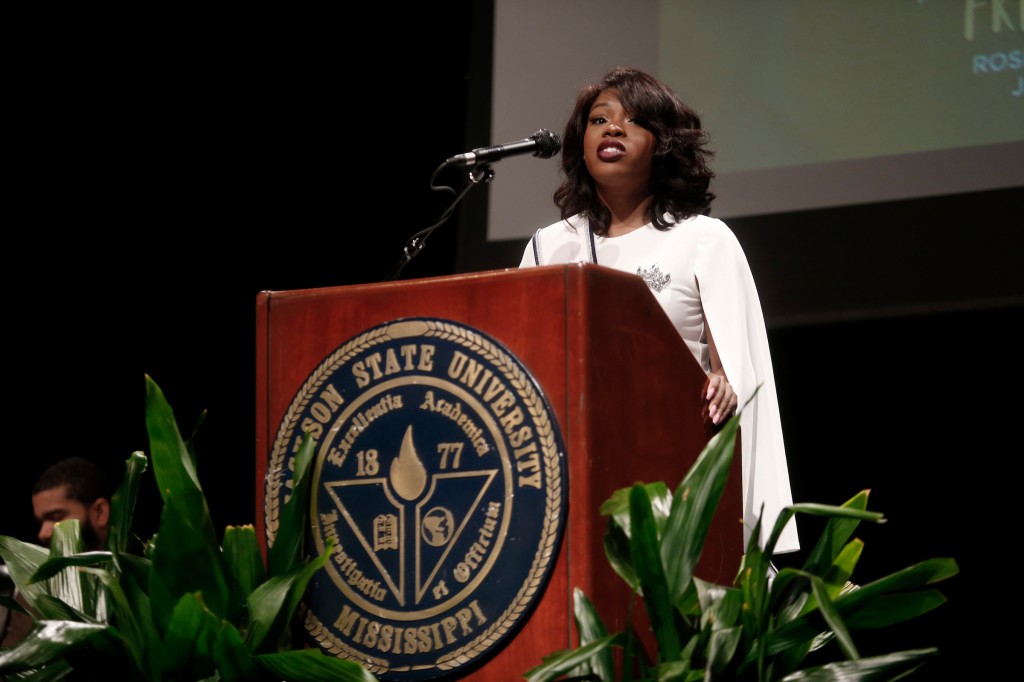
Her African-American history professor challenged students to attend class, one day, as someone they admired. So Joiner showed up as Madame CJ Walker complete with a faux fur and straightening comb.
“Here on this campus, our professors saw so much promise in us. They were preparing us for our future,” she said. “We were becoming productive citizens. We were training to enter the world of work and give back to society.”
Joiner then asked the audience to imagine being at JSU excited about their future when suddenly their lives are interrupted because of their skin color.
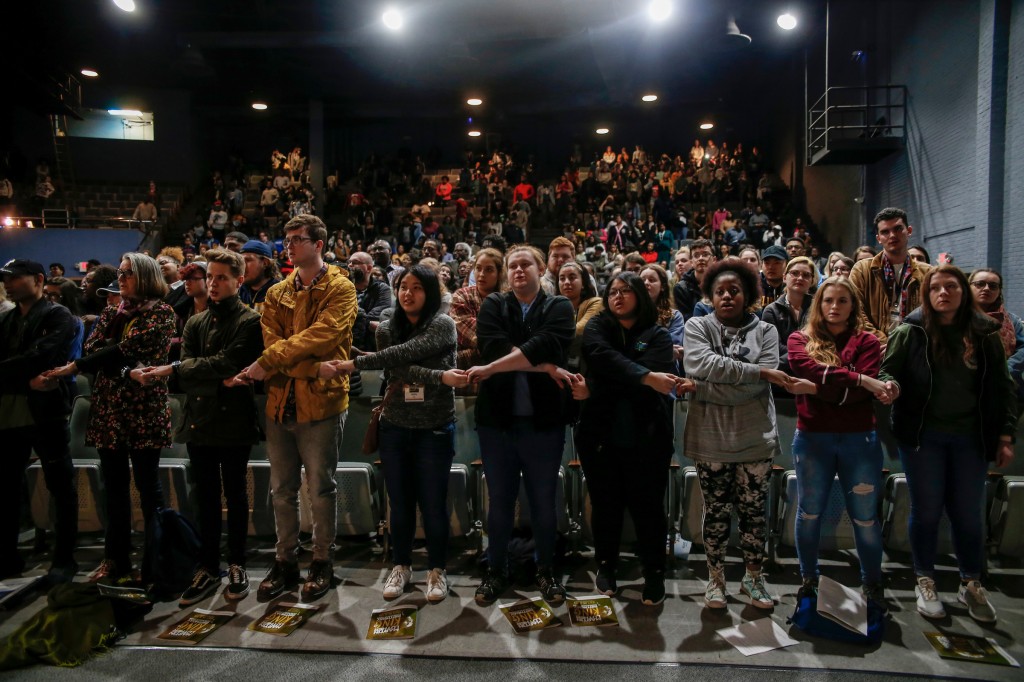
The real humanitarian crisis
“Today, as we celebrate what would’ve been Dr. Martin Luther King’s 90th birthday, I would like to talk about the real humanitarian crisis,” said Joiner, before launching into various heart-wrenching examples of racial discrimination like the Groveland Four, who in 1949 were falsely accused of raping a white woman.
An angry mob chased and killed one of the young men. The other three were convicted and put in prison; one for life and two on death row. In 1951, the United States Supreme Court ordered a retrial of the latter two. However, on the way to the new trial, both men were shot by the Sheriff, who claimed they tried to escape. One man succumbed to
his injuries, while the other was sent back to prison. In 2017, the
four were posthumously exonerated.
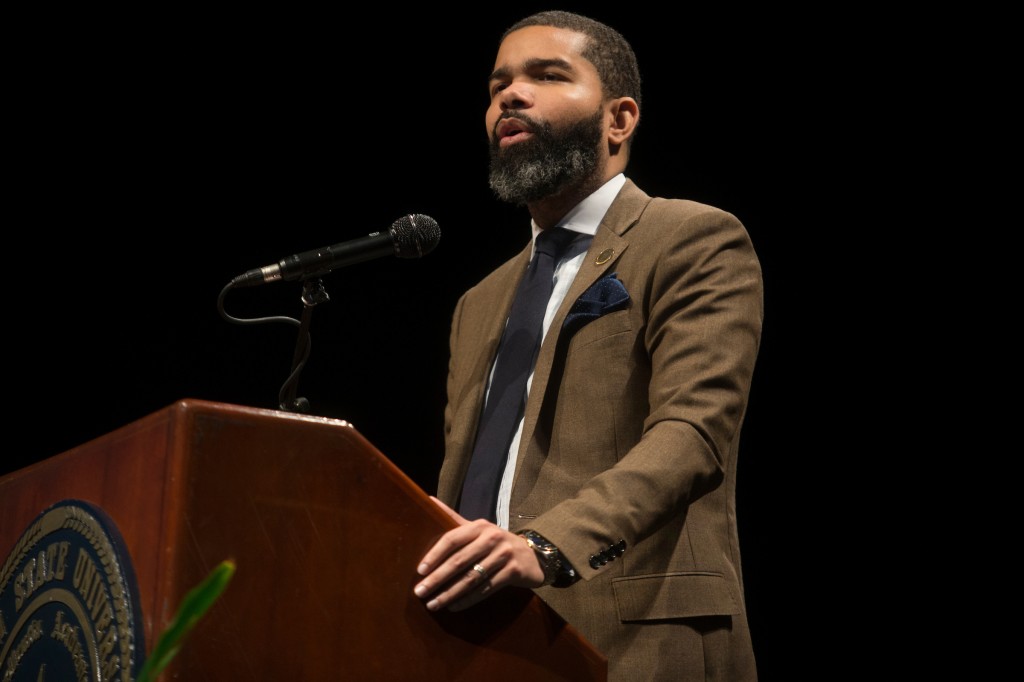
Joiner, talked about Kalief Browder, a 16-year-old imprisoned in 2010 for three years without a trial for the alleged theft of a backpack. He faced senseless abuse and solitary confinement while incarcerated. Two years after his release, Browder committed suicide.
“Hope Unborn,” Joiner said from the podium. “All examples of lives lost to an unjust criminal justice system that preys on poor and minority populations, draining our communities of brain power and talent.”
She then pointed out that although African-Americans make up 13 percent of the population, they are the majority of individuals wrongly imprisoned.
“Ladies and gentlemen, this is the real humanitarian crisis. The thousands of lives lost to wrongful convictions,” she stated with compassion. However, Joiner did not stop there; she included the following social injustices as an example of the humanitarian crisis:
• Poverty and a failed education system
• Voter suppression
• Racially motivated violence
• Unarmed black people killed by police
She also referenced the arguably alarming number of incidents where the police were called on people of color for doing seemingly ordinary things like black men meeting at Starbucks; black women playing golf; black children selling water, mowing the lawn or taking a swim; or black families reuniting in a park over barbecue and potato salad.
For my people
Joiner then charged the JSU community to vote, illustrating the power in voting.
“We are voting for our families. We are voting to protect our communities. We are voting so that no harm comes to our children. We are voting so that our water will not be poisoned like in Flint,” she said. “We are voting so that future generations will not be murdered without consequence like Emmett Till, Trayvon Martin, and Laquan McDonald. We are voting so that 800, 000 federal workers can support their families.”
“Serve” was the second charge made by Joiner. “Dr. King said life’s most persistent and urgent question is what are you going to do for others. Dr. King also said, ‘Everybody can be great because everybody can serve,’” she shared. “You don’t have to have a college degree to serve. You don’t have to make your subject and verb agree to serve. You only need a heart full of love and grace. A soul generated by love, those are Dr. King’s words.”
Immediately following the MLK Convocation, the Margaret Walker Center held its 24th Annual For My People Awards in the student center ballroom. Joiner and the following individuals were honored for their contributions to African-American history and culture: Pamela Junior, on behalf of the Mississippi Civil Rights Museum; Charlie Braxton, writer, poet, playwright and journalist; and Grace Sweet and Benjamin Bradley, co-authors of the book “Church Street: The Sugar Hill of Jackson, Mississippi.”
Dr. Robert Luckett, associate history professor and director of the Margaret Walker Center, explained that the recipients made their marks on local, state, and national levels.
“We were proud to lift up the work of the Mississippi Civil Rights Museum in its first year of existence, the research and writing of Grace Sweet and Benjamin Bradley, the literary contributions of Charlie Braxton, and the social impact of Lottie Joiner through her role as editor-in-chief of the NAACP’s The Crisis magazine,” Luckett said.
Braxton, JSU alum and former Student Government Association president, said he was naturally honored beyond measure. “As a poet, Dr. Margaret Walker was one of my idols and to win an award named after her historical poem, ‘For my People,’ is a supreme accolade for a poet.”
Junior, director of the Mississippi Civil Rights Museum, said when accepting the award, she was reminded of the reason the museum was built. “It was built ‘For My People.’ This place, this museum, the people’s museum has become an educational tool to the masses, and we wear this title with humility and courage.”
All award recipients offered their appreciation to Luckett and the Margaret Walker Center’s board of directors.
